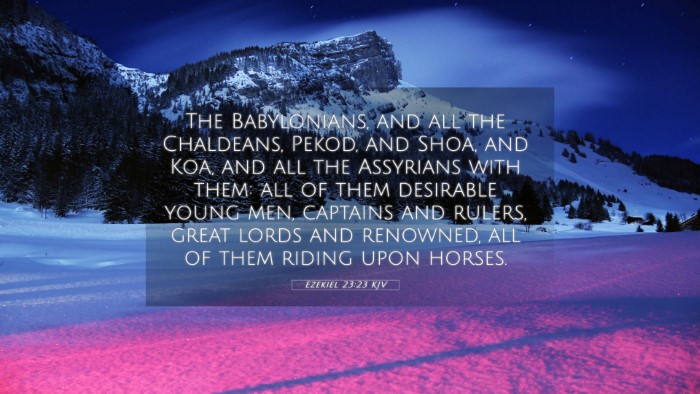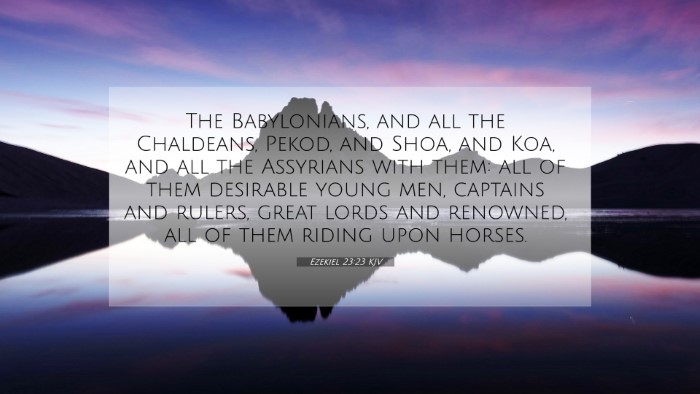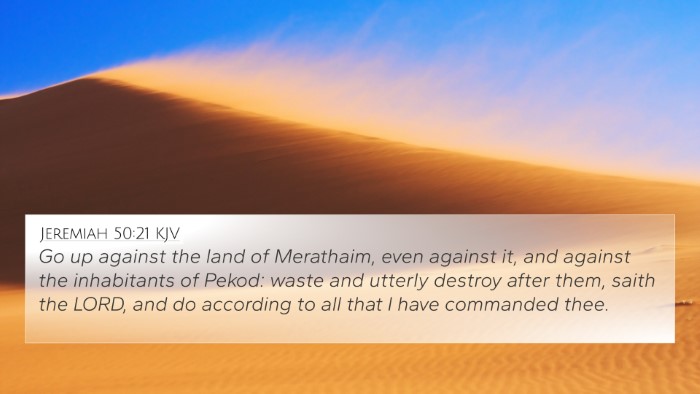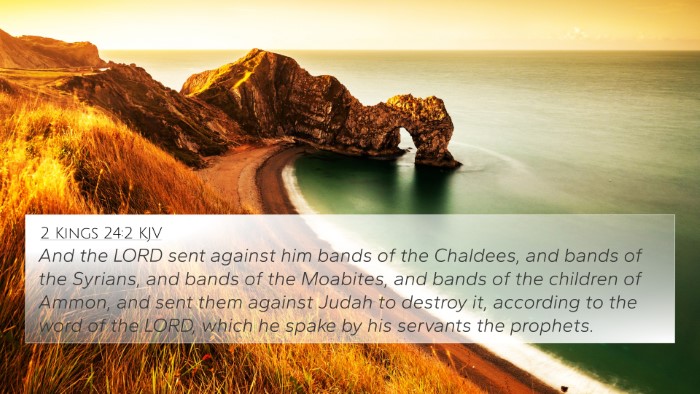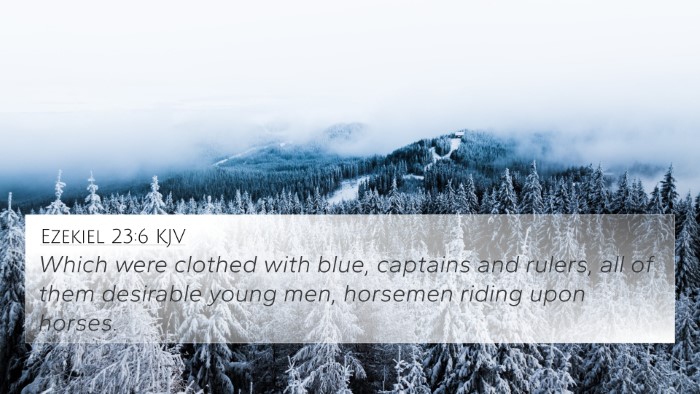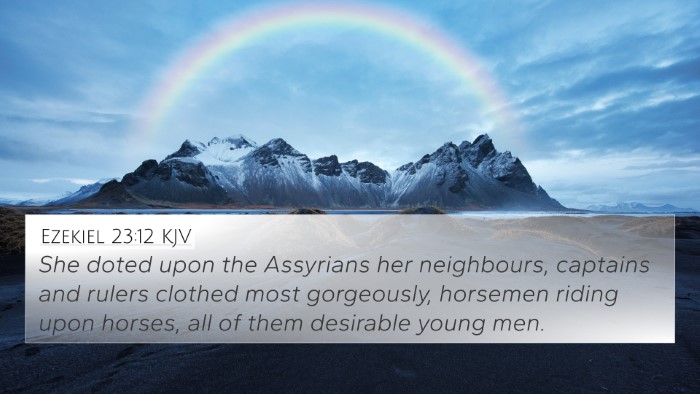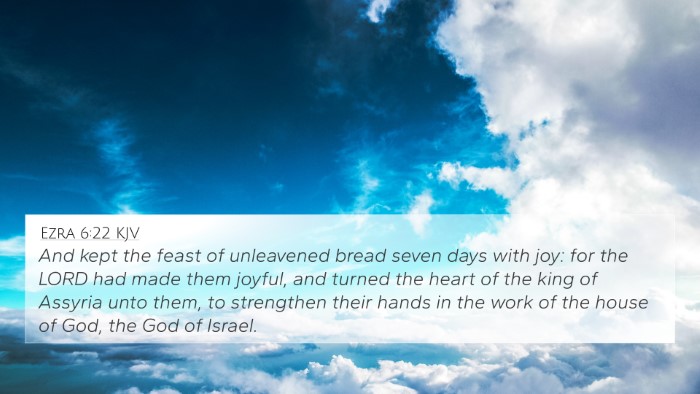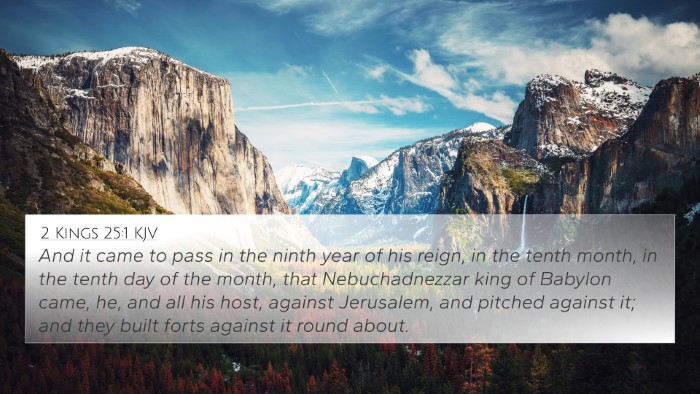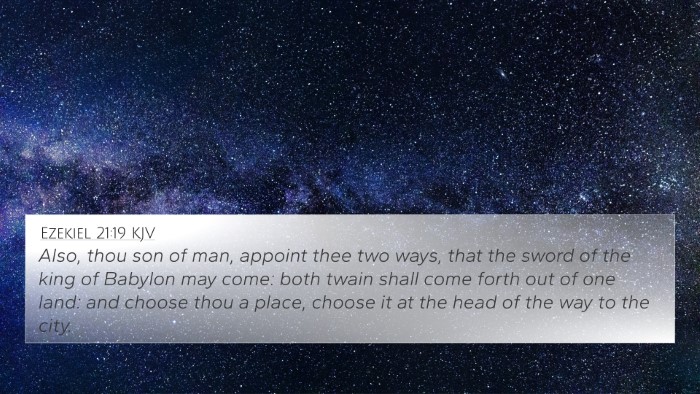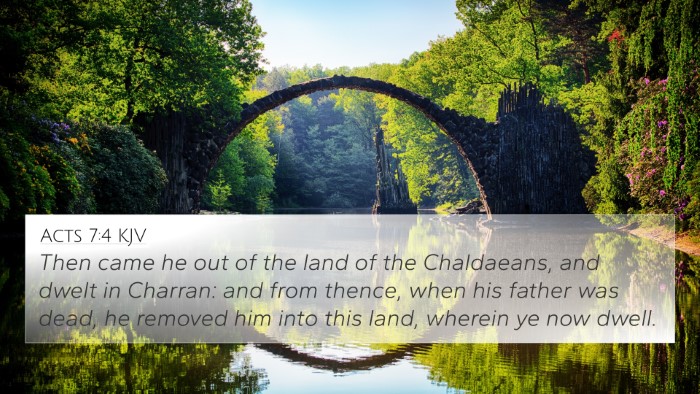Ezekiel 23:23 - Verse Meaning and Analysis
Ezekiel 23:23 is a prophetic verse from the Book of Ezekiel, utilizing vivid imagery to convey spiritual truths regarding the people of Israel. This verse reads:
"The Babylonians and all the Chaldeans, the men of Assyria, and all the young men desirable, horses, and all the men of war, and they shall come against thee with chariots, and wagons, and a multitude of people: and they shall set against thee buckler and shield, and helmet round about: and I will set judgment before them, and they shall judge thee according to their judgments." (Ezekiel 23:23 KJV)
This verse follows a narrative describing the betrayal of Israel, personified as two sisters, Oholah and Oholibah, signifying the northern and southern kingdoms. This imagery illustrates Israel's infidelity and the consequences of turning away from God.
Summary of Biblical Insights
According to public domain commentaries, the verse emphasizes several key points:
- Symbolism of Nations: The mention of Babylonians, Chaldeans, and Assyrians indicates the impending judgment and invasion due to Israel's unfaithfulness.
- Call to Accountability: The reference to judgment suggests an impending reckoning for both the actions of Israel and their alliances with foreign powers.
- Descriptive Judgment: The detailed description of war and conflict underlines the severity of the situation and the divine retribution that is about to unfold.
- Theme of Betrayal: The imagery of sexual infidelity represents Israel’s spiritual unfaithfulness to God, making these nation’s invasions a metaphorical act of judgment for their disloyalty.
Cross-References and Thematic Connections
This verse can be linked to several other scriptures that resonate with its themes of judgment and infidelity:
- Ezekiel 16:35-37: A graphic portrayal of Israel's unfaithfulness likened to a harlot, leading to judgment.
- Isaiah 47:1-3: The fall of Babylon, emphasizing retribution for their oppression of God’s people.
- Jeremiah 5:7-9: God’s complaint about Israel’s apostasy and unfaithfulness.
- Hosea 4:10-12: Israel's idolatry and its consequences, compelling the theme of divine judgment.
- James 4:4: Spiritual adultery mentioned in the New Testament, linking worldly alliances to enmity against God.
- Revelation 17:1-2: The harlot image again appears in a prophetic context representing corruption and judgment.
- Amos 2:4-5: Judgment against Israel due to their transgressions and oppression.
Interpretational Insights from Commentaries
Various commentaries provide further insight into the meaning of Ezekiel 23:23:
- Matthew Henry: Emphasizes the seriousness of rejecting God’s commandments and the eventual consequences of such actions; likens Israel to a fruitless vine.
- Albert Barnes: Highlights the certainty of judgment, noting that the foreign nations represent the tools of God’s wrath, underscoring the theme of divine sovereignty over global affairs.
- Adam Clarke: Discusses the historical context, interpreting the alliances formed by Israel with foreign powers as acts of rebellion against God, leading to inevitable destruction.
Applying the Insights: How to Use Cross-References
For deeper understanding, one may utilize tools for Bible cross-referencing by exploring the relationships between these linked scriptures. Various methods include:
- Using a Bible concordance to find thematic ties between passages.
- Employing a Bible cross-reference guide to broaden the exploration of similar themes across the Bible.
- Engaging in cross-reference Bible study techniques, such as thematic categorization or verse mapping.
Thematic Analysis: Interpreting Connections
The connections between Ezekiel 23:23 and related verses can provide a framework for thematic analysis in Bible verse study.
- This verse creates an opportunity to explore how Israel's history of idolatry connects with New Testament warnings against spiritual infidelity.
- By examining the links between the Prophets and Apostolic teachings, one can gain insight into the continuity of spiritual themes throughout scripture.
- This verse and its connections serve as crucial preparation for Bible cross-references for sermon preparation, enabling pastors and teachers to communicate these truths effectively.
Conclusion
In summary, Ezekiel 23:23 stands as a profound warning regarding the consequences of spiritual unfaithfulness and idolatry. By employing a thorough approach to cross-referencing biblical texts and understanding the interconnectedness of Bible verses that relate to each other, one can deepen their understanding of the text's historical and spiritual significance.
Remember: The study of cross-references enriches our comprehension of scripture, revealing the threads that unite the Old and New Testaments in a cohesive narrative of God's relationship with His people.

